|
|
|
Sort Order |
|
|
|
Items / Page
|
|
|
|
|
|
|
| Srl | Item |
| 1 |
ID:
114663


|
|
|
|
|
| Publication |
2012.
|
| Summary/Abstract |
Like other global powers, the UK treats South Asia as a cluster of uneven states where the process of regional co-operation has faltered and failed. The region's history and socio-economic and strategic realities demand an outlook that both addresses its key security and development concerns and widens the scope for co-operation in promising, yet-to-be charted sectors. While the power balance in Asia is in a process of realignment, the UK's alliance with India over and above other regional players may lead to tension that is both avoidable in the current strategic context and unproductive. A range of factors, such as the UK's historic linkages with South Asia, the current trend of bilateral relations and the focus of the UK's country programmes across the region, call for some innovation and realignment of the resources and a fresh strategic perspective.
|
|
|
|
|
|
|
|
|
|
|
|
|
|
|
|
| 2 |
ID:
114656
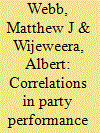

|
|
|
|
|
| Publication |
2012.
|
| Summary/Abstract |
Using a panel data estimation technique, this article examines correlations in party performance in India for political parties that contested legislative assembly and federal parliamentary elections held within the following eighteen months during the period between 1980 and 2009. The results are analysed according to a range of variables, including type of party and voter turnout. The study's finding that, across party types, there is a strong and statistically significant correlation in party performance between the two elections provides empirical corroboration of prior studies that have suggested the existence of enduring linkages between politics at the state and federal levels. It also offers some validation for the popular media's and others' preoccupations with the outcome of legislative assembly elections as indicators of subsequent parliamentary polls.
|
|
|
|
|
|
|
|
|
|
|
|
|
|
|
|
| 3 |
ID:
114658
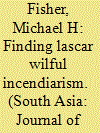

|
|
|
|
|
| Publication |
2012.
|
| Summary/Abstract |
From the 1790s to the 1850s, three dozen major merchant ships burned in India's important ports. Panic-stricken British shipowners, merchants and East India Company officials apprehended disruption of their intercontinental trade, so vital to the burgeoning British Empire. In all these cases, they accused Indian seamen (lascars) of selfish ship-burning. As a context, the lascars had, for centuries prior to European arrival in the Indian Ocean, worked collectively under their own petty officers. They and Indian recruiters in each port had long resisted colonial efforts to appropriate their maritime labour system. Britons used this half-century of alleged arson to finally impose British controls over lascar recruitment ashore and conditions of service aboard ships.
|
|
|
|
|
|
|
|
|
|
|
|
|
|
|
|
| 4 |
ID:
114659
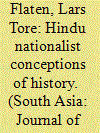

|
|
|
|
|
| Publication |
2012.
|
| Summary/Abstract |
In this article, I seek to examine some key mechanisms underlying the dichotomisation between Hindus and Muslims in Hindu nationalist history writing. Two arguments are central to this study. One is that the strict dichotomisation between Hindus and Muslims presupposes homogeneous categories. This is particularly clear if one examines how Hindu nationalist intellectuals made sense of ambiguities, of individuals and cultural traditions that did not fit directly into the categories, 'Hindus' and 'Muslims'. Moreover, I discuss the role of the so-called hidden 'Others'. I argue that these hidden 'Others' represent, in the form of alternative principles of grouping, the largest obstacle to the Hindu nationalist construction of a Hindu-Muslim dichotomy, both at the political level and within the field of history writing.
|
|
|
|
|
|
|
|
|
|
|
|
|
|
|
|
| 5 |
ID:
114662
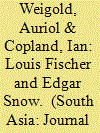

|
|
|
|
|
| Publication |
2012.
|
| Summary/Abstract |
In the absence of direct diplomatic links with India because it was part of the British Empire, President Roosevelt of the United States found means to monitor the political situation there when the Cripps Mission to India of March-April 1942, which offered a small measure of reform, ended in failure as predicted. His 'emissaries' in India, Louis Fischer and Edgar Snow amongst others, uncovered a very different version of the failure of the Cripps Mission. Their articles, published from September 1942 onwards, let their American readers and Churchill's information bureaux know that British propaganda had been shown up for what it really was-a bid to retain British control of India.
|
|
|
|
|
|
|
|
|
|
|
|
|
|
|
|
| 6 |
ID:
114654


|
|
|
|
|
| Publication |
2012.
|
| Summary/Abstract |
Reviving Ayurveda in post-colonial India has paradoxically been a nationalist venture, where the post-colonial state has restructured traditions, rather than reviving traditional Ayurvedic education, training and apprenticeship. After more than a half century of Indian independence, the majority of Ayurvedic practitioners perceive the impact of British colonial rule negatively, despite the fact that they followed Western methods and frameworks to revive Ayurveda. Today, the training in and research of Ayurvedic education has moved out of the traditional apprenticeship system and into the formal education system. This paper argues that the formalisation and professionalisation of Ayurveda has created an avenue for Ayurvedic graduates to practise backdoor allopathic medicine. Modern-day Ayurvedic practitioners tend to perceive their Ayurvedic training from an allopathic perspective.
|
|
|
|
|
|
|
|
|
|
|
|
|
|
|
|
| 7 |
ID:
114655
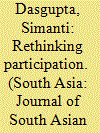

|
|
|
|
|
| Publication |
2012.
|
| Summary/Abstract |
This paper focuses on the discursive notion of participation central to two discourses, democracy and development. The contemporary rhetoric of development not only opens up the market for the economic progress of developing nations, but also demands a change in the political structure to facilitate the process. Thus, democracy is recruited as collateral for development, which theoretically improves the participation of the target population. However, my ethnography in Bangalore-the Silicon Valley of India-shows that the new middle class is partaking of development projects to reclaim participation solely for democracy. As a 'reassemblage', participation is employed to reconfigure democracy and development along different political axes. I present a public water supply project to describe the boundaries between the two discourses, arguing that they are drawn internally rather than externally.
|
|
|
|
|
|
|
|
|
|
|
|
|
|
|
|
| 8 |
ID:
114661


|
|
|
|
|
| Publication |
2012.
|
| Summary/Abstract |
This essay argues that the building of Angelo da Fonseca's critical fortune as a Christian artist from the 1930s to the 1950s was simultaneously and necessarily the building of his later misfortune and oblivion as a modern artist. Angelo da Fonseca was characterised as a Catholic painter during the first half of the twentieth century after the advice to 'paint churches' purportedly given to him by Rabindranath Tagore (or perhaps his nephew, Abanindranath Tagore). At the time, there was a generalised movement for the creation of a new Christian art involving many artists from all over the world. They too have vanished from art history's printed memory. This was due to modernism's exclusion of Christianity as a subject, which made it impossible for historians and critics to deal with twentieth-century Christian art. This, it will be argued, eventually led to a further exclusion: Indian Christian art was seen as simultaneously un-modern and un-Indian and was, therefore, omitted from the process played by the arts in India's nation-building.
|
|
|
|
|
|
|
|
|
|
|
|
|
|
|
|
| 9 |
ID:
114660


|
|
|
|
|
| Publication |
2012.
|
| Summary/Abstract |
Charles Prinsep, a prosperous Calcutta lawyer and sometime advocate general of the East India Company, was active amongst a network of British entrepreneurs in India who were enthusiastic about an Indian Ocean sub-empire, the potential of the Australian colonies to become trading partners with India, and their prospects as destinations for British residents to settle after their Indian service. During the 1820s and 1830s, Prinsep embarked on a series of ventures to purchase land, establish shipping links and export indentured Indian labour to Australia. In Australia, agriculturalists and merchants were also interested in the potential of Indian indenture schemes to respond to projected shortages of labour with the demise of convictism in the Eastern Australian colonies. A number of shipments of indentured Indian labourers arrived in Australia during the 1830s. These schemes were opposed by the Colonial Office and by many in Australia, particularly urban dwellers, who feared that such a 'degradation' of the labour market would discourage European settlement in the Australian colonies, which they wanted reserved for Europeans, that other great diaspora of the nineteenth century.
|
|
|
|
|
|
|
|
|
|
|
|
|
|
|
|
| 10 |
ID:
114657


|
|
|
|
|
| Publication |
2012.
|
| Summary/Abstract |
A woman's capacity to participate in politics is a constitutionally entrenched and fundamental right in Bangladesh, repeatedly affirmed in several pieces of legislation, the most recent being the Local Government Act, 2009. Despite the endorsement of a series of affirmative features to promote women's equality, empirical research reveals very disappointing results. This paper investigates some of the fundamental constraints that hinder women's participation in Union Parishads, the third tier of local government, with special reference to a number of serious flaws in the Act. A compassionate approach is developed for the workplace to accommodate exceptional gender-centric concerns in Union Parishads by fostering a relationship in which men and women see each other as interdependent and interconnected.
|
|
|
|
|
|
|
|
|
|
|
|
|
|
|
|
|
|
|
|
|